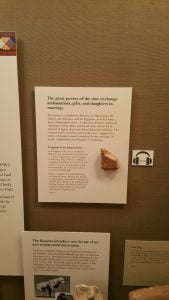
The Amarna Letters are a collection of 380 clay tablets from the Office-House of Letters of Pharoah at Amarna, Egypt, now mostly in the British Museum. Conservatives believe that the Exodus was in 1446 BC, while liberal scholars believe that “if” there was an Exodus it was several centuries later. From a conservative date, these letters would be in the time of the early Judges.
Amarna Letter 289 is from the King of Jerusalem to Pharoah complaining that Labayu gave some of the land of Shechem to the “Habiru.” Many other Amarna letters refer to these Habiru. The word “Habiru” refers to fugitives or refugees, so while one can’t definitively say all Habiru are Hebrews, it is possible from a conservative date for the Exodus, that some Habiru were Hebrews.
Why is Shechem important to a Bible student?
Genesis 12:6-8 – “And Abram passed through the land unto the place of Sichem, unto the plain of Moreh. And the Canaanite was then in the land. And the LORD appeared unto Abram, and said, Unto thy seed will I give this land: and there builded he an altar unto the LORD, who appeared unto him. And he removed from thence unto a mountain on the east of Bethel, and pitched his tent, having Bethel on the west, and Hai on the east: and there he builded an altar unto the LORD, and called upon the name of the LORD.”
During the time of the Amarna letters – Gideon’s son Abimelech tried to set himself up as king.
Judges 9 1-2 – “And Abimelech the son of Jerubbaal went to Shechem unto his mother’s brethren, and communed with them, and with all the family of the house of his mother’s father, saying, Speak, I pray you, in the ears of all the men of Shechem, Whether is better for you, either that all the sons of Jerubbaal, which are threescore and ten persons, reign over you, or that one reign over you? remember also that I am your bone and your flesh.”